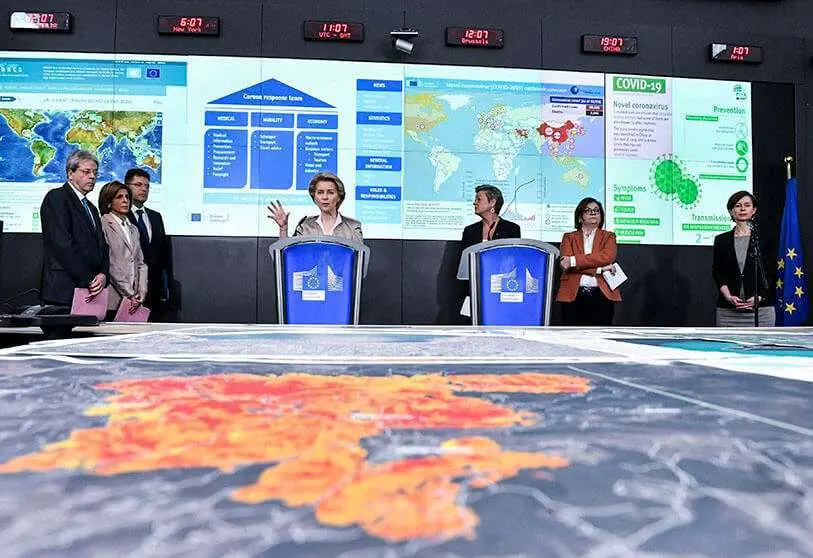The Eurogroup, or the Titanic Orchestra

It is not surprising that Frenchman Jean Monnet, president of the Action Committee for the United States of Europe from 1956 to 1975, proclaimed that "Europe will be forged in its crises, and will be the sum of the solutions adopted in these crises". Deep down, Monnet was saying the same thing that the German Nietzsche had said before: What doesn't kill you, makes you stronger". The same music, but with different lyrics, as has always been the case since the establishment of the Franco-German axis in 1950.
Europe's own national plurality and its deep historical contradictions have shaped the structure of the European project, adopting the model of gesellschaft (normative association) and not that of gemeinschaft (identity association), making virtue of the need to get around a series of micro-crises (Bosnia, Maastricht, Lisbon), until the Great Recession of 2008 demonstrated the limitations of the European treaties in tackling interconnected transnational problems. The decisions taken then, led by the so-called Troika (the European Central Bank, the European Commission and the IMF) suddenly cured the naivety of the newcomers to the European Union and sowed a tare which culminated in Brexit, followed by the illiberal emboldening of the Visegrad countries.
This is the context in which the new European Commission, chaired by Ursula von der Leyen, had to pass, without a solution of continuity, of leading the Green Pact - not free of suspicions of protectionism through the back door - to face a pan-European crisis that it doesn't seem exaggerated to call existential. Old habits take a long time to die, and prejudices even longer. Displaying an astonishingly selective moral outrage, some EU countries responded with déjà vu to calls for help from their European partners in terms of national rhetoric and some schadenfreude; some gloating over the calamities of the south.
After a lot of tug-of-war, and no small representation to the gallery, even the staunchest advocates of fiscal orthodoxy finally admitted that one-member state's deficit is another member state's surplus, and agreed to a 'recovery fund' worth over half a trillion euros; a compromise drafted with enough ambiguity to serve as a fig leaf for both. Although these shock measures will prevent the immediate collapse of Spain and Italy, their conditionality implies more dependence than solidarity, and therefore has only postponed the taking of the hard decisions on which the vertical growth of the European project will depend, or its horizontal fading away.
The current complexity of international relations, and the gap between the economic power of, for example, China and the Netherlands, forces the EU to play reluctantly by the rules of realpolitik, a domain in which the relevance of Calvinist sermons and the narcissism of small differences is laughable. Paraphrasing Lord Palmerston, the EU will end up understanding that the other powers have no permanent friends or enemies, only permanent interests, and that, therefore, pursuing a policy of Divide and Empire within a monetary and customs union is the best way to make it easier for the large economic blocs competing with the EU to take advantage of their inability to act centrally and cohesively.
None of the threats to an EU reduced by 16% with the departure of the United Kingdom can be tackled alone. Nor will this catastrophe be the last, nor can the economic shock that will follow be overcome by the EU without acting as a de facto nation state, including the same kind of fiscal transfers that occur between Connecticut and Mississippi, or between Madrid and Extremadura. Naturally, this is a double-edged sword. In a democracy there can be no taxation without representation, so it isn't legitimate for a third country to have the tax collection of another, outside a strict framework of common duties and rights, and without the scrutiny of the parliaments of the countries that have collected those taxes. In this sense, the main threat to the European project is the European project itself, as it is currently articulated, because it doesn’t have adequate mechanisms to mutualize risks and benefits, allowing taxpayers to have the confidence that their taxes don’t serve to support irresponsible spending policies.
If this is not achievable, it will be unfeasible for the EU to count on the support of EU citizens to face the budgetary, industrial and political-strategic challenges that will arise during this decade, and which will require strategic investments to guarantee European autonomy in security, which will make it necessary to reinforce the funding that the member states make for 'Permanent Structured Cooperation' and the reduced contributions of the European Commission to the European Defence Fund dedicated to jointly developing defence capabilities. This improved funding of defence instruments doesn’t make sense without speeding up the use of these resources to tackle geostrategic threats in the Mediterranean, the Baltic and the Balkans. Europe's ability to respond to emergencies cannot be conditioned by a bureaucratic system that seems to be an end in itself, such as the one that took two weeks to activate the response of the EU's Civil Protection Mechanism to the Italian request for assistance.
When the pandemic passes, the conflicts in Libya, Palestine, Syria, and the Sahel will still be there, and probably, mutatis mutandi, new hotbeds of tension will already be looming on Europe's borders. No one will take Europe seriously if its own leaders don't take themselves seriously, and stop treating their citizens like children to be told fables of ants and cicadas.

